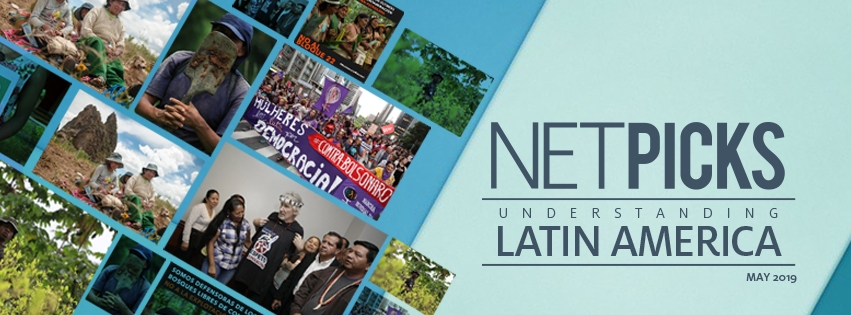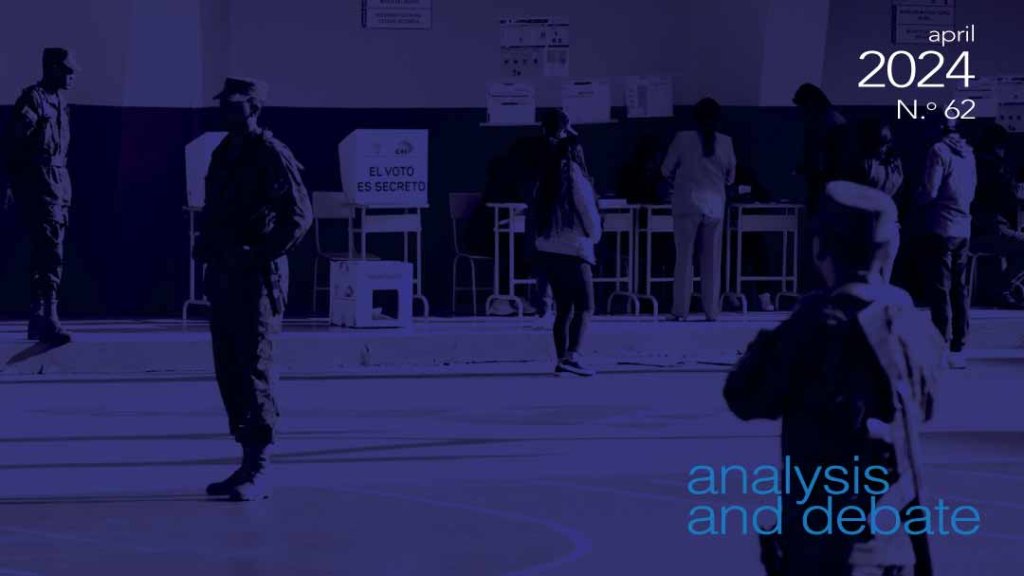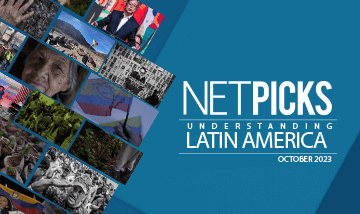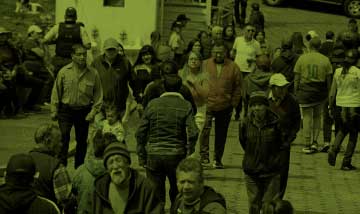Índice
- NETPICKS: UNDERSTANDING LATIN AMERICA
- A NEW DAWN FOR LATIN AMERICAN MILITARIES
- A NEW DAWN FOR LATIN AMERICAN MILITARIES
- CHEVRON VS ECUADOR: INTERNATIONAL ARBITRATION AND CORPORATE IMPUNITY
- CHEVRON VS ECUADOR: INTERNATIONAL ARBITRATION AND CORPORATE IMPUNITY
- FROM BOLIVIAN COCAINE TO COLOMBIAN GOLD, LOW-LEVEL INVOLVEMENT IN ILLICIT ECONOMIES IS OFTEN DRIVEN BY POVERTY AND MARGINALISATION
- FROM BOLIVIAN COCAINE TO COLOMBIAN GOLD, LOW-LEVEL INVOLVEMENT IN ILLICIT ECONOMIES IS OFTEN DRIVEN BY POVERTY AND MARGINALISATION
- BRAZIL UNDER BOLSONARO: SOCIAL BASE, AGENDA AND PERSPECTIVES
- BRAZIL UNDER BOLSONARO: SOCIAL BASE, AGENDA AND PERSPECTIVES

NETPICKS: UNDERSTANDING LATIN AMERICA
Selected food for thought about Latin America. Every month we trawl the web for in-depth analysis, research summaries and opinions we think particularly worth reading, and that you won’t find in the mainstream media.
In this month’s offering, you’ll find four well written and researched articles we think pertinent to the present situation in Latin America. They speak to the problematic rise of military presence in the entire region; the lack of mechanisms to enforce rulings on environmental and social damage caused by multinational companies; the need to tackle the reality of links between poor communities and illegal activities; and, finally, an analysis of Bolsonaro government and its support amongst various sectors of in Brazilian society.
Here are our picks for May:
A NEW DAWN FOR LATIN AMERICAN MILITARIES
A NEW DAWN FOR LATIN AMERICAN MILITARIES
Latin America is not known for its major inter-state wars, and the number of border conflicts is minimal. The region is better known for its guerrilla insurgencies, but with the Peace Accords signed with the FARC in Colombia; these are at an all time low. Major conflict is now more associated with the doubtless unwinnable ‘War on Drugs’. The role of the military would therefore seem to be less relevant, and during the period of the ‘progressive’ governments their role was in fact reduced, some of its members even being prosecuted for crimes committed during repressive military regimes of the nineteen, seventies, and eighties. But the armed forces are also a political and institutional force. They have reacted by successfully lobbying the region’s new right of center regimes, with the help of the United States and its military industrial complex, for increased funds and an increased role. Even in countries such as Mexico, which could be considered to have one of the region’s only left of centre government, Latin American militaries now effectively control large areas of the country. They have been aided by low levels of confidence in the police, who are often seen as corrupt, while the increasing penetration of drug related criminal gangs has lead civilian populations to demand more involvement in an attempt to stem the tide of violence. But past experience with the military in Latin America shows that this could be a dangerous tendency. The line between internal security and repression of protest and alternative progressive organizations is a thin one.
Brett J. Kyle & Andrew G. Reiter. NACLA Report on the Americas. 29th March 2019
CHEVRON VS ECUADOR: INTERNATIONAL ARBITRATION AND CORPORATE IMPUNITY
CHEVRON VS ECUADOR: INTERNATIONAL ARBITRATION AND CORPORATE IMPUNITY
The lack of ability of those affected by illegal activities of multinational corporations to claim compensation, and the need for an international agreement to remedy the situation, is highlighted by the case brought in 1993 by residents of the Ecuadorian Amazon against the Chevron-Texaco oil giant. The company operated in the country from 1964 to 1992, and according to the plaintiffs disposed of nearly 650.000 barrels of crude oil and more than 16 billion gallons of wastewater in the rivers and soils of the Amazonian jungle, affecting the health and lives of more than 30.000 people. The suit was apparently settled in 2018 when Ecuador’s Constitutional Court, the country’s highest legal instance whose rulings are final, confirmed a 2011 decision to award damages amounting to 9.5 billion US dollars. But Chevron succeeded in presenting itself to an international tribunal as the victim of extortion, attaining in the process a bizarre ruling that demanded that Ecuador compensate the company and revoke the court’s decision. According to lawyer Pablo Fajardo: “the panel has no competence, no legal capacity to order an independent and sovereign State to annul a final criminal sentence ordered by a court under Ecuador’s legal system”. The history of the case brings in focus the lack of effectiveness of present human rights systems to enforce their mandates. While multinational corporations benefit from mandatory international mechanisms to protect investments, compliance with mandates for the protection of human rights and the environment tend to be voluntary or unenforceable. The answer may be the Binding Treaty on Transnational Corporations and Human Rights currently being promoted within the United Nations (UN) by international organizations and the Global Campaign to Dismantle Corporate Power. But it will not be easy.
Aldo Orellana López. Open Democracy. 27th March 2019
FROM BOLIVIAN COCAINE TO COLOMBIAN GOLD, LOW-LEVEL INVOLVEMENT IN ILLICIT ECONOMIES IS OFTEN DRIVEN BY POVERTY AND MARGINALISATION
FROM BOLIVIAN COCAINE TO COLOMBIAN GOLD, LOW-LEVEL INVOLVEMENT IN ILLICIT ECONOMIES IS OFTEN DRIVEN BY POVERTY AND MARGINALISATION
The repeated and predictable failure of crop substitution programs in Latin America has demonstrated the need for a different approach to illicit economies. The reality is that many impoverished communities have depended on growing coca for the cocaine trade as the only effective way of making even a meager living: alternative programs generally suffer from a lack of economies of scale, poor infrastructure, and fluctuations in global prices. No one is getting rich however, as the major profits, as might be expected, accrue to the traffickers. Military intervention and enforced eradication policies, as well as having little impact on overall production, have only exacerbated a difficult situation for communities that are often caught in the crossfire between drug gangs and the armed forces. A new approach is clearly and urgently needed. Development organizations have been slow to recognize the situation but are now coming together to find ways to improve an often desperate situation. The United Nations Development Program, has highlighted the damaging effects of drug-control policies on human development, while the outcome document of the 2016 UN General Assembly on the World Drug Problem recognized that efforts to tackle illicit drug economies and achieve Sustainable Development Goals were complementary and mutually reinforcing.
Allan Gillies (University of Glasgow). LSE blogs 05th April 2019
BRAZIL UNDER BOLSONARO: SOCIAL BASE, AGENDA AND PERSPECTIVES
BRAZIL UNDER BOLSONARO: SOCIAL BASE, AGENDA AND PERSPECTIVES
Brazil is a deeply divided country, where racism, social exclusion and class divisions are factors that cannot be ignored in any attempt to understand the reality of the country and the election of the extreme right winger Jair Bolsonaro. For example, for many middle class people influenced by the evangelical sects and their creed of personal responsibility it was not acceptable during the Workers Party years “that Afro-descendants, Indigenous or Northeastern working-class individuals and families could sit side by side with white Southern upper-middle class students in a university classroom or travelers on an airplane.” Bolsonaro’s rise to power is also related to the profound effects of the 2008 economic crises: low commodity prices and economic slowdown having a major impact on employment levels: GDP fell 7.2 per cent between 2015 -2016, and unemployment reached 12% during the 2018 election year. Bolsonaro’s recipe is neoliberal in the extreme, and his government is ultra-conservative in the political and social sphere and economically ultra-liberal. This is unparalleled, above all given the major participation of the military in Bolsonaro’s government. The armed forces have traditionally been economically nationalist, a fact that has led them to be considered as a somewhat of a ‘moderating’ force and a possible source of division within the new regime. The challenge for the left is now to work with the poor in the churches and counteract right wing attitudes, and in the favelas and in the peripheries where precarious workers may not even consider themselves ‘working class’, let alone identify with the ‘Workers Party’.
Ana Garcia, socialistproject.ca April 15th 2019





